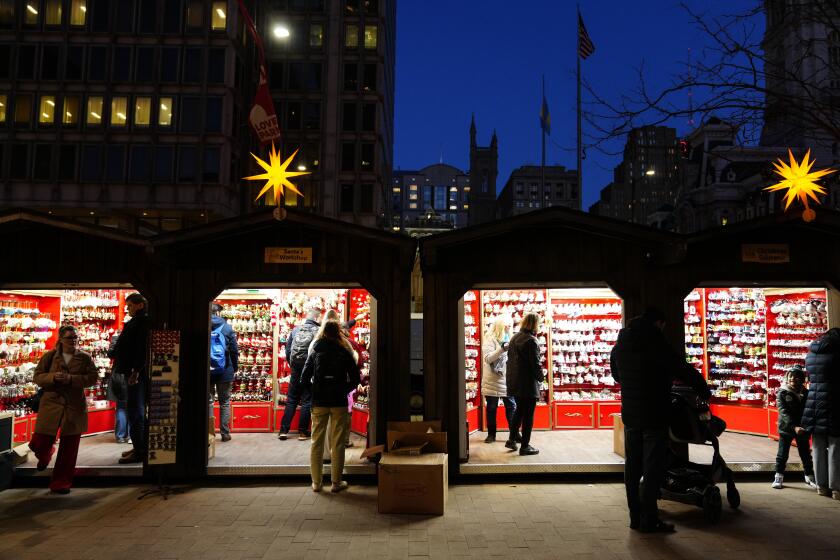They planned to sell an iPad online. It ended with an in-person robbery. Here’s how to stay safe

- Share via
A couple in Pomona who were selling an iPad were held at gunpoint and attacked during a meetup with a potential buyer, a crime that experts say happens too often but can be avoided if online sellers take some common-sense steps to ensure a safer sales experience.
Two teenagers who were accused of committing the armed robbery on Dec. 23 were taken into custody Jan. 3 and then to juvenile hall, said Aly Mejia, spokesperson for the Pomona Police Department.
One of the victims, Eduaro Reyes, told KTLA-TV Channel 5 that he met the potential buyer through OfferUp, an online marketplace where users can sell their items to local buyers. Reyes met the buyer in a residential neighborhood, but when he stepped out of his car, one teenager aggressively shoved the barrel of the handgun against Reyes’ neck while trying to grab the iPad.
The second teen ran from around the street corner to ambush the couple, according to footage obtained by KTLA.
Reyes told KTLA that he’s sold over 50 items through the OfferUp platform without an issue.
Online marketplaces are a common place for people to sell used items, but most users have a false sense of security when using the platforms, said Iskander Sanchez-Rola, director of privacy innovation for cyber safety network Gen. Although it appears that online marketplaces are secure ways for buyers and sellers to interact, he said users need to be skeptical and take steps to ensure their safety and privacy online and in person when using the platforms.
Two Covina residents have been arrested on suspicion of robbing and killing a 20-year-old man awaiting a transaction arranged through a popular marketplace app, authorities said Sunday.
Don’t share personal information
There are many online marketplaces that allow you to post and sell your used items for free while others take a percentage of the transaction.
Craigslist, which started as an email distribution list in 1995, dominated as a virtual classified ad for just about anything you could think of, including bikes, patio tables and guitar amps. But online thrifting has grown to platforms such as EBay, OfferUp, Depop and Facebook Marketplace.
When you’re creating an account or using an existing marketplace account, be sure to access it with a secure computer. Avoid using public computers or connecting to a public Wi-Fi because scammers can hack into your computer and steal information.
Similar to any online platform, limit your digital footprint. Sanchez-Rola said don’t post or share personal information including your phone number, address, Social Security number, bank information or credit card information.
ADT, a residential and business security company, advises that you use a proxy email address so you don’t get spam to your personal email address after you buy or sell online. If you share your phone number, for example, scammers can try to retrieve information that’s linked to it.
When deciding which marketplace to use, remember that the safer platforms are not going to ask you to post personal information, Sanchez-Rola said.
If you want to go the extra mile, turn off the location function on your camera when taking pictures of the item. Photos taken with your smartphone have the location and other information embedded within the image. Sanchez-Rola said some marketplaces will remove that information when you upload the image, but others will not.
Holiday sales rose this year and spending remained resilient during the shopping season, even with Americans wrestling with higher prices in some areas and other financial worries.
Verifying the seller or buyer
Every account user, buyer or seller, should have a public profile that has their name and a photo of the account user along with past and present item listings.
Sanchez-Rola and other experts shared some red flags of potential scamming profiles:
- A blurry photograph or no photograph in the profile.
- A blurry photograph for the item listing.
- No past listings or just one listing.
- No reviews from previous sales.
- Negative reviews of a seller not following through with a sale.
You can go the extra mile and try verifying whether a photo is fake by using a reverse image search (Google shares steps on how to conduct this search). Scammers can steal photos and create fake accounts.
User accounts typically have information on the number of successful or completed sales as well as reviews. Sanchez-Rola said profiles that have positive reviews and several sales have more validity than an account that has zero sales, no comments and no profile picture.
A major red flag is an expensive item that’s listed at a very low price. For example, if a seller is offering a $1,000 iPhone 15 Pro max for $200, that’s not realistic, Sanchez-Rola said. Remind yourself, if its too good to be true it probably is.
Other potential red flags to look out for include when a person asks you to communicate outside the marketplace. Sanchez-Rola said most, if not all, platforms have a communication system and he advises you stay in it. AARP says to keep the conversation to the product. Don’t get chatty because you might unintentionally share information about yourself.
If you can help it, Sanchez-Rola also advises that payment should be made through the marketplace as well. Sharing information for Venmo, Paypal or other money-wiring services puts your personal information at risk.
Police took crime-fighting online this weekend, using an app to nab a trio of suspected thieves, alleging that the two men and a woman used a dating app to lure a man to a park in Pomona, where they stole his cellphone and car.
Safely meeting up
Some marketplaces have the option to mail the product to the buyer and if you choose to do so, experts suggest you use a P.O. box and never share your personal address. If you choose to hand over the product in-person, Sanchez-Rola said payment should be handled through marketplace beforehand.
Experts say buyers and sellers should go to these meet-ups with the bare minimum.
“Don’t show up with the new watch that you got for Christmas,” Sanchez-Rola said.
Law enforcement officials, including the Pomona Police Department, advise that you choose a safe place that is busy, public and well-lighted. Never invite strangers to your home to pick up an item.
Some police departments have designated safe exchange zones, locations that are typically under video surveillance. The Los Angeles Police Department launched several locations and has worked with OfferUp to have the location information on the platform. The Safe Trade Station also lists which police departments have safe exchange locations. Others advise that you use police stations or police department parking lots to conduct a transaction, but first call your local police department to verify whether they have a safe spot.
Whether you meet at a public place or a designated safe zone, experts say never go alone. Bring a friend or family member and let another trusted person know the details of the meetup.
More to Read
Sign up for Essential California
The most important California stories and recommendations in your inbox every morning.
You may occasionally receive promotional content from the Los Angeles Times.















